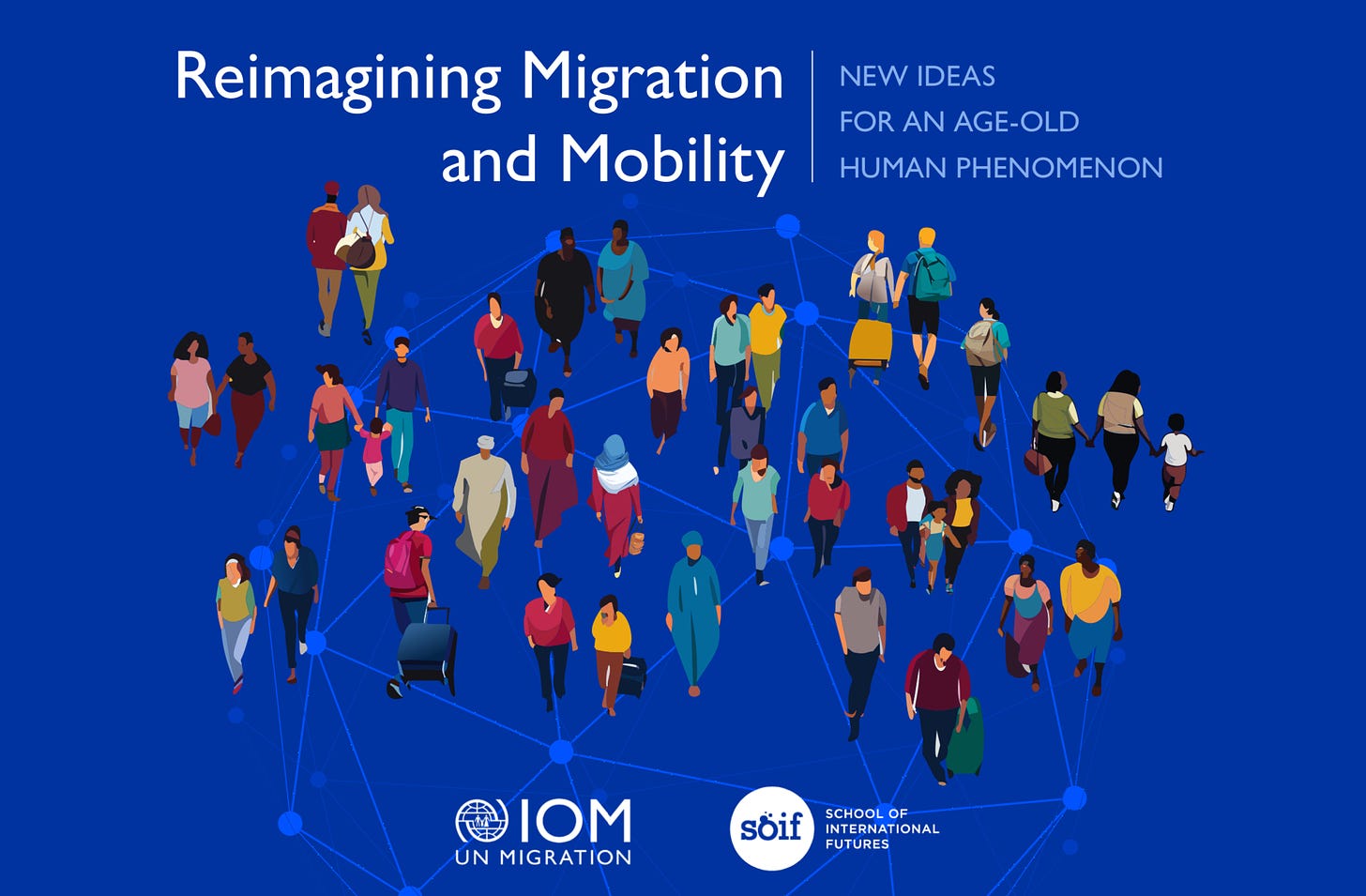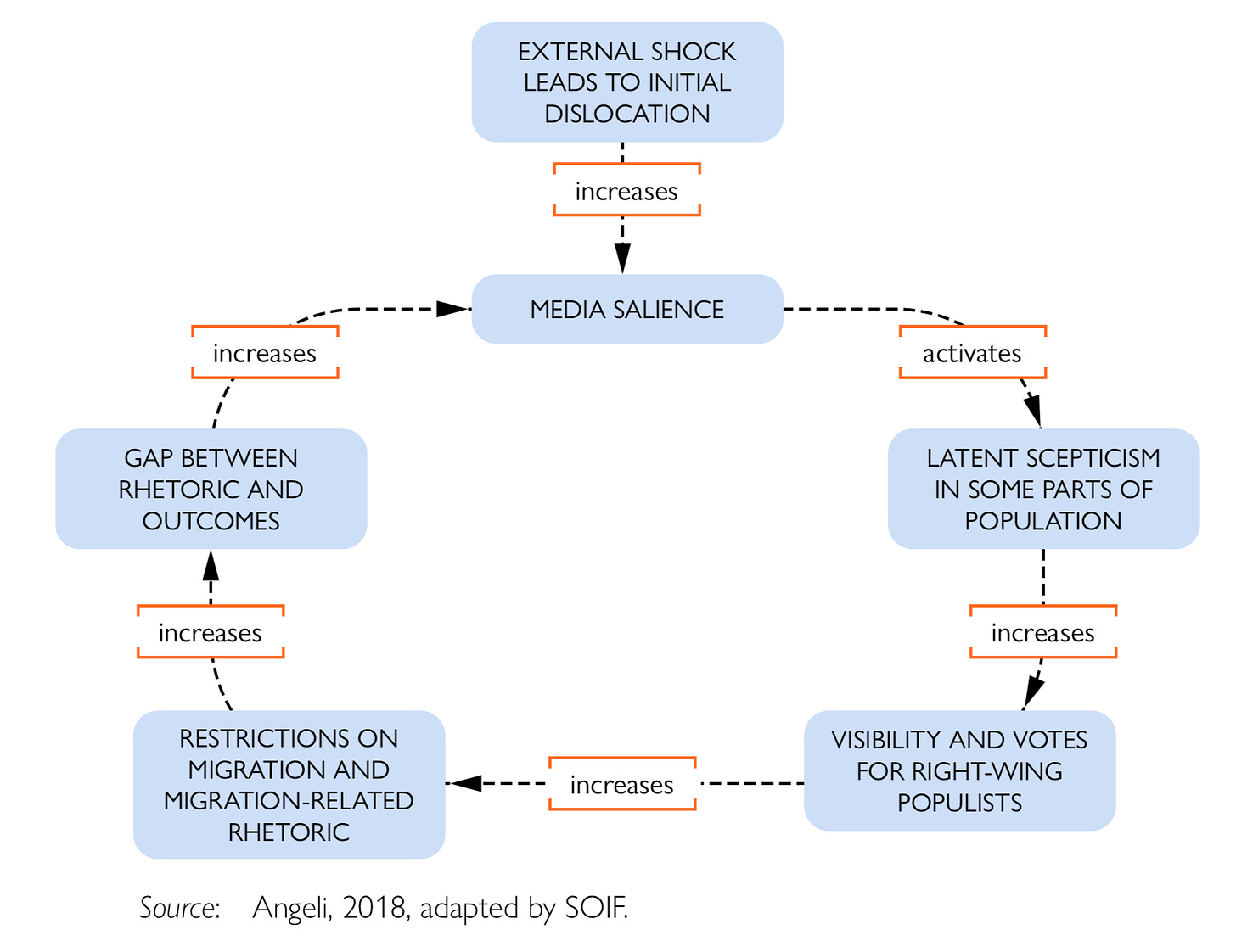The Rethinking Migration and Mobility report that I co-wrote for the International Organisation for Migration has been published. My fellow authors are my SOIF colleagues Paul Raven and Iman Bashir. It’s a thinkpiece which is intended as a contribution by the IoM to the United Nations Summit of the Future
As I think I have mentioned here before, Iman and I facilitated a workshop with a group of migration experts in Istanbul in October. This provided an initial set of ideas for the report which we then developed with some supporting research and analysis.
The report can be downloaded here.

I’m sharing here a version of the section of the report on the challenge of making migration a less toxic political issue. It’s a bit more academic in style than my usual articles here.
The road ahead: a (geo)politics of migration
Because parties and politicians across the world make political capital out of migration, the public and political discourse around migration is routinely described as “toxic.” In a recent article about the narrative construction of “migration”, Sommer (2022) notes that
pragmatic policy narratives of crisis management clash with aggressive discourses of xenophobia and racism, cosmopolitan counter-narratives and the humanitarian storytelling employed by NGOs.
Over the last decade, though, it is these populist and “xenophobic” discourses on migration that have been normalised by the mainstream. These play out in public attitudes. More than with any other policy area, there is a chasm between what the data tell us about migration, and what people believe to be true about it. In a survey of six developed countries,
respondents greatly overestimate the total number of immigrants, think immigrants are culturally and religiously more distant from them, and economically weaker – less educated, more unemployed, and more reliant on and favored by government transfers – than they actually are (Alesina et al., 2022).
Globalisation shocks
This fits with a perspective which says that the rise of global populism is a reaction to two things: the over-reach of globalisation in the 1980s and 1990s, and a long secular shift in generational values.
Alesina et al. say “there is compelling evidence, from a variety of settings, that globalisation shocks, often working through culture and identity, have played an important role in driving up support for populist, particularly right-wing, movements.” This also positions “reimagining of migration and mobility” as a fundamentally political project.
Processes therefore matter. Different political and media actors are enrolled at different moments in a cycle that uses migration to feed right-wing rhetoric (see figure). External shock leads to an internal dislocation of some kind, which becomes a media subject in traditional and social media.
This then feeds through into the political system, at the level of both rhetoric and regulation (Angeli, 2018). Since migration is a necessary part of well-functioning labour markets, however, there is always a gap between the rhetoric and the outcomes.
Figure: The vicious cycle of migration discourse

‘Migration’, ‘crisis’, and ‘control’
Recent behavioural research has focused on the construction of the underlying schema of “migration as crisis” that sits behind this cycle. Taking the Ukraine war and the Afghanistan evacuation as examples, Cantat et al. (2023) observe that migration is not always a “crisis”. The activation of that particular framing is always a choice.
On this reading, “migration” and its “control” become an expression of deeper anxiety about the control of the State, at both a national level and an individual level. This “crisis” framing is then expressed through rhetoric about “control” and “containment” that is always incomplete. This is the policy cycle that sits behind the political cycle in the figure above.
These narratives
rely on the assumption that migration is not (or should not be) a normal phenomenon… This blocks the recognition of migration as a structural feature of today’s world, and the elaboration of long-term, systemic political strategies.
Migration, then, which first became an issue with the development of the modern nation-state in the twentieth century, has become a signifier of a whole range of problems experienced by the twenty-first century state.
This suggests that rethinking migration requires strategies that can operate at two levels. There is the immediate challenge of finding ways to break the political cycle; then there is a deeper challenge, which is to detach the notion of “migration” from the deeper anxieties for which it has become a proxy.
Changing the narrative
Battles over narratives are typically also battles over political frames. Lakoff (2004) characterizes the difference between conservative frames and progressive frames as being expressed in metaphors about the family. Conservative ideas stem from a notion of “the strict family”; progressive ideas from a notion of “the nurturant family”.
These conflicting sets of ideas can also be seen in the frames deployed against modernity and for it, by authoritarians and populists and their political opponents respectively, as discussed earlier. Clearly the current discourse about migration comes from “the strict family”.
In Lakoff’s description, the values that sit behind the nurturing family include freedom, opportunity, prosperity, fairness, community-building and trust. The advantages that flow from migration – economic, sociocultural and civic–political – resonate strongly with these values. They also underpin a different narrative about the purpose of the state. They speak beyond migration to tell broader stories to all citizens about the role of a supportive and infrastructural twenty-first century form of government.
Telling your own story
As Sommer (2022) says, “The pro-migrant narrative and the anti-migrant narrative are incommensurable.” Reframing involves telling your story on your terms, rather than trying to argue with opponents on their terrain, which serves only to make their argument resonate more strongly. In the words of Alesina et al., “views on immigration are more sensitive to salience and narratives than to hard facts.”
The challenge of reframing, therefore, is to build a base that is willing to speak for migration in narratives that progressive and centrist voters can support. Since part of the politics around migration is a response to globalization, this cannot only be done top-down by global institutions. However, local activist groups get lost in the noise; the contrast between well-funded and organized anti-migration parties and the bootstrapped community groups that seek to defend refugees and migration could not be sharper.
Filling this gap requires a serious coalition-building project – bridging the local, the national and the international. One successful precedent would be the peacebuilding project, which brings together concerned scientists and technical experts with religious groups such as the Quakers that work both locally and globally.
This is slow work. As Lakoff reminds us, when your opponents have control of the frame, it takes time to build a different version of it; but there is a political audience for this story and it is likely to grow as time passes. Migration politics is at its core a struggle over values, and the values of the younger generations are much more aligned with the story of opportunity, fairness and trust.
—-
There is also a playlist that was developed during the workshop and curated by Iman afterwards.
https://open.spotify.com/embed/playlist/1qR8dJBPpsRXs0SgrQ3b4z
—-
References
Alesina, A., A. Miano and S. Stantcheva (2022). Immigration and redistribution. NBER Working Paper 24733.
Angeli, O. (2018). European migration policy and the rise of populism. European Insights.
Cantat, C., A. Picoul and H. Thiollet (2023). Migration as crisis. American Behavioral Scientist.
Lakoff, G. (2004). Don’t Think of an Elephant! Chelsea Green, White River Junction, Vermont.
Sommer, R. (2023). Migration and narrative dynamics. In: P. Dawson and M. Mäkelä (eds.). The Routledge Companion to Narrative Theory. Routledge, New York.